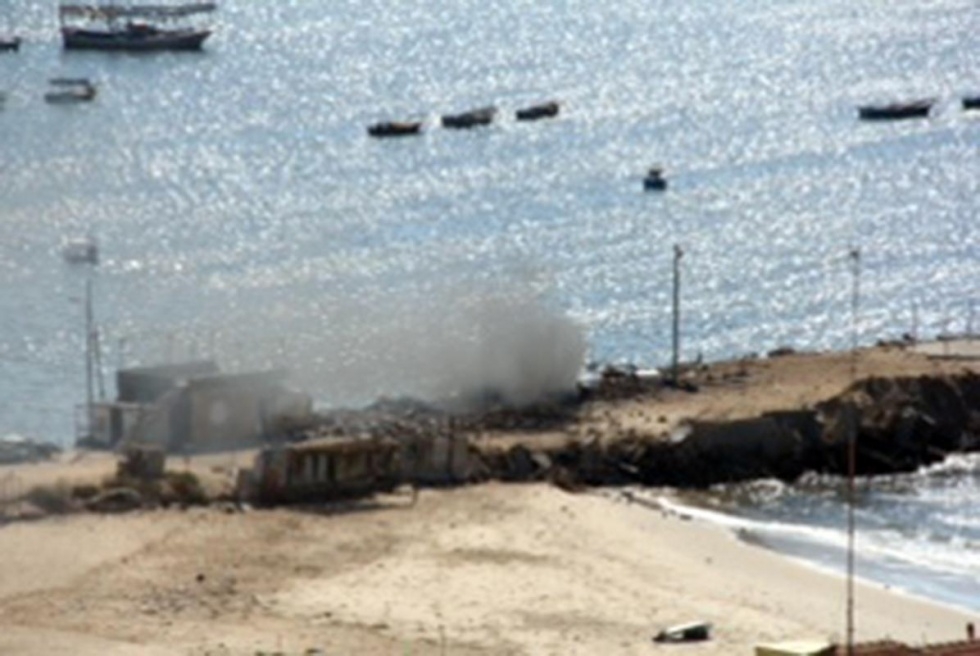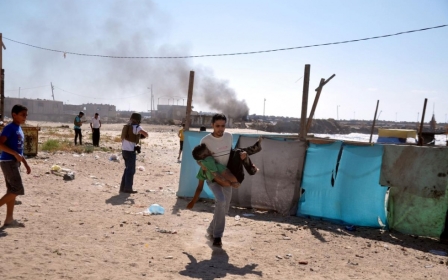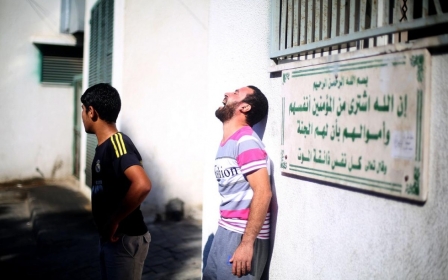Israel's 'tragic mistake'

A tragic mistake: this is how the killing of four children from the same family is described in the Israeli media. “The Mistake” is a concept or military philosophy entrenched in Israeli military thinking and is an event that can stop an otherwise perfect military operation. It is the bug which may cause the system to stop, such as the shelling of a UN post at Kana in southern Lebanon in 1996 where more than 100 Lebanese civilians were killed. This episode forced Israel to put an end to its military operation against Hezbolla. Sometimes described as a mistake, sometimes as a fault or a hitch, the killing at Gaza beach of undisputed innocent civilians in front of Western cameras whose innocence cannot be disputed may lead Israel to accept ceasefire terms that it had rejected before, according to this military philosophy.
The killing of the four boys from the Bakr family was a mistake as no Israeli officer on the boat that fired the deadly missile nor at higher levels had given an order to deliberately target these boys as they were playing football near the beach at the Gaza port. But given the way in which Israeli operations have been conducted in the last days, such an event is more a probability than a mistake. Operation Defensive Edge, even more than previous operations in Gaza and Lebanon, targeted dozens of civilian buildings under the pretext that they serve as private homes for leaders of Hamas or Islamic Jihad. The list of private buildings, published daily by the mostly reliable Palestinian Centre for Human Rights (PCHR), is depressingly long. When these buildings are the targets, when the justification for the attacks is to deter and punish more than to hit actual military threats, then the killing of innocent civilians is more of a probability to take into account rather than that of a full-blown mistake.
This probable or even inevitable mistake is almost a direct result of the current state of Operation Defensive Edge. Israel was maybe not completely surprised from the fact that Hamas and Islamic Jihad rejected the ceasefire offered by Egypt on Tuesday morning, but nevertheless this unconditional rejection put Netanyahu and his government in an uncomfortable situation, a situation in which it had to choose between two unhappy options: either accept some of Hamas' demands, like easing the blockade on Gaza, thus giving the Islamist organisation some sort of gain and creating political problems for Netanyahu; or the other option was to order a ground operation, something which Netanyahu and the military has very little appetite for as even hardliners like Foreign Minister Lieberman or Economy Minister Benet are distancing themselves from the idea of the reoccupation of the Gaza Strip.
Israel, as usual, opted for the third option: the continuation of its hit-deter-punish operation in Gaza. The fact is that Hamas' rockets had a small effect on human lives due mainly to the Iron Dome system. Yet in cities like Ashdod and Beersheva where more than 200,000 people reside, economic life almost came to a halt. Cities closer to Gaza like Ashkelon or Sderot, and even in Tel Aviv, are not full as they used to be. Netanyahu knows that such a situation cannot continue for too long without creating internal problems. A prolongation of the conflict in its current shape might also create an impression that Israel and Hamas are equal enemies, the first firing rockets, the second striking from the air. This is not a situation in which Israel likes to find itself.
Under political pressure to do something, a forth option was suggested: reinforce the Dahiya Doctrine, this time levelling the northern neighbourhoods of Gaza like Beit Lahiya, Saja'ia and others, in order to make it easier for the Israeli air force to target rocket launchers and other installations used by the Palestinian military groups to attack Israel. Israeli airplanes dropped tens of thousands of leaflets over these neighbourhoods urging their residents to leave their homes and move south, towards Gaza. But surprisingly for Israel, most of these residents stayed, making a Dahiya-like bombardment impossible, as it would result in the death of thousands or maybe tens of thousands of civilians. As Mahmud Juda , a Palestinian resident of this area wrote in a heart-braking piece published in "Al-Hayyat", they were given a choice to leave their homes and "die another thousand times or to refuse to leave and die only once".
This seemingly suicidal choice made by tens of thousands of Gazans is maybe Hamas’ strongest point at the moment. Civilians exposed themselves to bombardments and shelling inside their own unprotected homes without an Iron Dome or even a simple shelter. As was pointed out correctly by many commentators, Hamas itself has nothing to lose due its terrible relations with Egypt, the crumbling of Syria, and the lack of support from Iran or its 40,000 officials who are not getting paid since the reconciliation agreement with President Abbas. After eight years of the blockade, and with electricity running eight hours a day in times of "peace", huge water and sewage problems, unemployment and poverty reaching skyrocketing levels, it seems that the entire population of Gaza has nothing to lose, and many are ready to die, so as to not return to a situation which existed before the current military operation began.
Therefore, when Hamas makes demands that are perceived as being out of touch with reality inside Israel, such as building a sea port and airport, or opening the border crossings not only with Egypt in Rafah, but also with Israel in Erez, or allowing people from Gaza to pray in Al-Aqsa, it has the support of the population whether they are Hamas supporters, Fatah activists or just ordinary citizens. Israel is very reluctant to fulfil any of these demands, not because they are irrational or necessarily dangerous to its defence, but because their fulfilment will put Hamas in a better position than it was before the beginning of Operation Defensive Edge or even before the start of the arrest campaign in the West Bank that followed the kidnapping and murder of three Israeli teenagers. This is all very hard for Israel to swallow.
In order not to accept these demands, Israel preferred to continue its operation as it had before, even though it was beginning to run out of targets. The almost inevitable result was the killing of four Palestinian boys on Gaza beach. Now we are left to see whether or not this “bug” in Israeli military doctrine will force it to accept ceasefire terms it had rejected before or if it will be drawn into a much feared ground operation. By pushing Hamas and the people of Gaza to the wall, Israel has lost its own ability to manoeuvre.
- Meron Rapoport is an Israeli journalist and writer, winner of the Napoli International Prize for Journalism for an inquiry about the stealing of olive trees from their Palestinian owners. He is ex-head of the News Department in Haaertz, and now an independent journalist.
The views expressed in this article belong to the author and do not necessarily reflect the editorial policy of Middle East Eye.
Photo: An Israeli airstrike kills 4 Palestinian children as they are playing on the beach on 16 July in Gaza City (AA)
New MEE newsletter: Jerusalem Dispatch
Sign up to get the latest insights and analysis on Israel-Palestine, alongside Turkey Unpacked and other MEE newsletters
Middle East Eye delivers independent and unrivalled coverage and analysis of the Middle East, North Africa and beyond. To learn more about republishing this content and the associated fees, please fill out this form. More about MEE can be found here.




